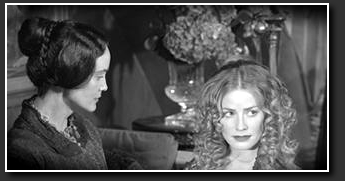|
|
|||||||
 |
|||||||
|
|
|||||||
|
|
|||||||
|
|
|
Cousin Butt
A little Jane Austen, maybe some Molieré. Cousin Bette, starring Jessica Lange, is the latest effort in tales of European aristocrats and their trials and travails - financial, social and otherwise - all juxtaposed with the plight of a vengeful ne'er-do-well cousin and street riots. The film is based on a novel by Honoré de Balzac and features several shots of Elizabeth Shue's ass and the comic prancings of Bob Hoskins. Also, lots of classical music. Lange, who in recent memory picked up her second Oscar for a movie no one saw, carries the movie with the black-eyed fervor of a woman wronged. The ne'er-do-well cousin of the title, Bette has had her life repeatedly stolen from her by her wealthier family, particularly her romantic life. She's alone, her family's housekeeper, and she lives in a starving, violent slum. And then, her young cousin steals her artist-would-be-boyfriend. Lange's performance is incredibly tense, riveting and controlled, especially in the face of the minor aristocrat antics that surround her. Lange's character also designs the costumes that expose showgirl Shue's buttocks; that is to say, she's constantly mooning the audience. Hoskins turns in another effete performance, like a straighter version of his Nixon J. Edgar Hoover, as the richest man in Paris, a man who seeks to dabble in young women. It is Hoskins' performance that provides life in the otherwise interminable subplots. In watching the costume piece, one realizes just how many films of one's own time, one's own youth, are based on roughly the same template. A seen of many lovers chasing each other down the hall harkens back to The Secret of my Success except in the Michael J. Fox vehicle no one dies. Lange and Shue's characters plot to undo the lives of Bette's family is played like a grim Outrageous Fortune. Actually, it's all very grim. The story, set against riotous, starving Paris, could have played up the plot rife with social fabric stresses- the poor versus the rich, the poor wanting to be rich, the rich wanting to sleep with the poor. Instead of the occasional peasant stampede or the begging of starving children played for laughs, a real statement could have been made. Against the proper background, Lange's performance wouldn't run the risk of appearing Dunoway-an, but rather would capture the rage of Holly Hunter's Piano performance. But the artsy want costumes, and mademoiselles and minuets, not revolution. |
|
|
|||
 |
|||||||
